|
|
|
Sort Order |
|
|
|
Items / Page
|
|
|
|
|
|
|
| Srl | Item |
| 1 |
ID:
157169


|
|
|
|
|
| Summary/Abstract |
This paper defends, and emphasizes the importance of, spaceflight, broadly construed to include human and unmanned spaceflight, space science, exploration and development. Within this discourse, I provide counter-replies to remarks by physicist Dr. Steven Weinberg against my previous support of human spaceflight. In this defense of peaceful spaceflight I draw upon a variety of sources. Although a focus is human spaceflight, human and unmanned modes must not be treated as an either-or opposition. Rather, each has a critical role to play in moving humanity forward as a spacefaring species. In the course of this communication, I also stress the perennial role of space agencies as science and technology-drivers, and their function to provide a stable and unified platform for space programs.
|
|
|
|
|
|
|
|
|
|
|
|
|
|
|
|
| 2 |
ID:
120649


|
|
|
|
|
| Publication |
2012.
|
| Summary/Abstract |
This paper explores the possible relationship between space exploration and long swings in the economy and socio-technical systems. We posit that the early phases of long upswings are characterized by periods of optimism and the spirit of adventure that provided a motivation for large-scale explorations and other great infrastructure projects in the past. These Maslow Windows help us understand prior eras of exploration and cultural dynamism, and offer a hopeful scenario for space exploration in the next two decades. We offer some observations as to what the exploratory thrust might look like, including a return to the lunar surface combined with other activities. Of course, we also point out that the next great wave of space exploration will almost certainly have a much more international flavor than has heretofore been the case.
|
|
|
|
|
|
|
|
|
|
|
|
|
|
|
|
| 3 |
ID:
127501
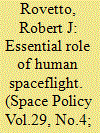

|
|
|
|
|
| Publication |
2013.
|
| Summary/Abstract |
The question is: should the United States and nations at large pursue a human spaceflight program (and if so, why)? I offer an unwavering positive answer to this question, and state the reasons for it while considering the broad challenges and benefits of (human) spaceflight. Space exploration is a human activity that is intrinsically forward-looking, and as such, has positive potential. Both national and international space programs can galvanize the population, inspire the youth, foster job-creation, and motivate the existing workforce. The nature of the enterprises involved-their scale, novelty, and complexity-requires a steady and continuous upward progression toward greater societal, scientific and technological development. That is, in order to overcome the challenges of human spaceflight, progress is required. More to the point, the survival of humanity depends on expanding beyond the confines of our planet. Human spaceflight, in short, presents us with an opportunity to significantly advance the nation and the global community.
|
|
|
|
|
|
|
|
|
|
|
|
|
|
|
|
| 4 |
ID:
124930


|
|
|
|
|
| Publication |
2013.
|
| Summary/Abstract |
A standard microeconomic tool is used to analyze quantitative data to reveal the attitudes of European states toward space exploration and exploitation. The contemporary economic crisis uncovers the real political priorities. The tool used helps us to distinguish between three policy types: activist, active, and passive. Words can radically differ from real actions of governments, as is shown in this article. Results indicate that there is a relatively strong core of supporting states of space exploration and exploitation in the middle of the European continent.
|
|
|
|
|
|
|
|
|
|
|
|
|
|
|
|
| 5 |
ID:
127512


|
|
|
|
|
| Publication |
2013.
|
| Summary/Abstract |
The envisaged future space research programmes, whether in the field of space exploration or Earth observation are becoming more and more technically complicated and so costly that a single nation can hardly afford to realize them. Major non-European space-faring nations, China and India will progressively play an important role besides US, Russia and Japan. The Space Advisory Group of the European Commission recommended that the European Commission supports within Horizon 2020 a comprehensive Robotic Mars-Exploration Programme under European leadership that should become an essential element of a coordinated international space research programme. The International Space Station (ISS) experience shows that cooperative space programmes build links between industries and laboratories from around the world, which then further develop in non-space related activities, with positive impact on the economy and scientific research. Strategies need to be developed to mitigate the gradual increasing risks incurred by climate change. In order to lower their entry barrier to engage in space emerging and developing space nations need to be included in cooperative space programmes. We present the recommendations of the Space Advisory Group of the European Commission concerning Europe's participation to global space endeavours.
|
|
|
|
|
|
|
|
|
|
|
|
|
|
|
|
| 6 |
ID:
169296
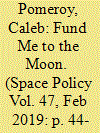

|
|
|
|
|
| Summary/Abstract |
The likes of Elon Musk and Jeff Bezos now occupy the headlines once dominated by Apollo and Soyuz. Described as New Space versus Old Space, debate surrounds the emerging commercial space industry and the role of nontraditional actors in the evolving contemporary space exploration environment. This article enters this debate by adopting a sociological approach to investigate the role of crowdfunding in financing space exploration today. We interviewed crowdfunded space project creators in disparate locations, from Moscow to Silicon Valley, who attracted capital ranging from $200 to over $1 million. We attempt to uncover their experiences using this distinctly social financing mechanism and find that although crowdfunding is unlikely to solve all of today's research funding conundrums, it does appear to increase access to space in unique ways. We argue, however, that the most interesting dynamic of this phenomenon is the way in which crowdfunding contributes to an increasingly democratic exploration environment and how this might impact space science research and the power structures of the space industry. This article concludes by considering possible implications of this trend and derives practical suggestions for both policymakers and individuals who may be considering the use of crowdfunding to finance space science research and exploration projects.
|
|
|
|
|
|
|
|
|
|
|
|
|
|
|
|
| 7 |
ID:
181654


|
|
|
|
|
| Publication |
Oxon, Routledge, 2022.
|
| Description |
79p.hbk
|
| Series |
The Gateway House Guide to India in the 2020s; 01
|
| Standard Number |
9780367678517
|
|
|
|
|
|
|
|
|
|
|
|
Copies: C:1/I:0,R:0,Q:0
Circulation
| Accession# | Call# | Current Location | Status | Policy | Location |
| 060086 | 629.40954/GIR 060086 | Main | On Shelf | General | |
|
|
|
|
| 8 |
ID:
148486
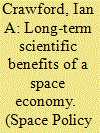

|
|
|
|
|
| Summary/Abstract |
Utilisation of the material and energy resources of the Solar System will be essential for the development of a sustainable space economy and associated infrastructure. Science will be a major beneficiary of a space economy, even if its major elements (e.g. space tourism, resource extraction activities on the Moon or asteroids, and large-scale in-space construction capabilities) are not developed with science primarily in mind. Examples of scientific activities that would be facilitated by the development of space infrastructure include the construction of large space telescopes, ambitious space missions (including human missions) to the outer Solar System, and the establishment of scientific research stations on the Moon and Mars (and perhaps elsewhere). In the more distant future, an important scientific application of a well-developed space infrastructure may be the construction of interstellar space probes for the exploration of planets around nearby stars.
|
|
|
|
|
|
|
|
|
|
|
|
|
|
|
|
| 9 |
ID:
132717


|
|
|
|
|
| Publication |
2014.
|
| Summary/Abstract |
In 2009 President Obama proposed a budget for the National Aeronautics and Space Administration (NASA) that canceled the Constellation program and included the development of commercial crew transportation systems into low Earth orbit. This significant move to shift human spaceflight into the private sector sparked political debate, but much of the discourse has focused on impacts to "safety." Although no one disputes the importance of keeping astronauts safe, strategies for defining safety reveal contrasting visions for the space program and opposing values regarding the privatization of U.S. space exploration. In other words, the debate over commercial control has largely become encoded in arguments over safety. Specifically, proponents of using commercial options for transporting astronauts to the International Space Station (ISS) argue that commercial vehicles would be safe for astronauts, while proponents of NASA control argue that commercial vehicles would be unsafe, or at least not as safe as NASA vehicles. The cost of the spaceflight program, the technical requirements for designing a vehicle, the track record of the launch vehicle, and the experience of the launch provider are all incorporated into what defines safety in human spaceflight. This paper analyzes these contested criteria through conceptual lenses provided by fields of science and technology policy (STP) and science, technology, and society (STS). We ultimately contend that these differences in definition result not merely from ambiguous understandings of safety, but from intentional and strategic choices guided by normative positions on the commercialization of human spaceflight. The debate over safety is better considered a proxy debate for the partisan preferences embedded within the dispute over public or private spaceflight.
|
|
|
|
|
|
|
|
|
|
|
|
|
|
|
|
| 10 |
ID:
122527
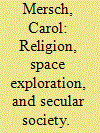

|
|
|
|
|
| Publication |
2013.
|
| Summary/Abstract |
This article concerns the efforts of Reverend John M. Stout and the Apollo Prayer League to land microfilm copies of the Christian Bible on the lunar surface during the Apollo era. The efforts of Stout, a NASA information scientist and industrial chaplain who orchestrated the years-long undertaking, underscored manned spaceflight not only as a technological and geopolitical achievement, but as a collective spiritual quest. The venture was countered at the time by the renowned head of the American Atheists, Madalyn Murray O'Hair, who insisted that religious artifacts and observances had no place on state-sponsored, taxpayer-funded missions. Stout believed that the astronauts themselves had rights guaranteed by the First Amendment. The rancorous debate between Stout and O'Hair, which was played out in the media, laid bare the innate conflict between personal religious freedom and the specter of state-sponsored religion in a secular society making its first expeditions into deep space.
|
|
|
|
|
|
|
|
|
|
|
|
|
|
|
|
| 11 |
ID:
122529
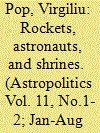

|
|
|
|
|
| Publication |
2013.
|
| Summary/Abstract |
This article examines the relationship between space exploration and sacred visual art, demonstrating that religious iconography and church architecture evolved by assimilating humankind's entry into the physical heavens as a living parable. This is proven by the presence of space exploration imagery within places of worship-from a church building inspired by a payload fairing to inclusion of space exploration milestones as historical landmarks, from astronauts being chosen as depictions of Christian virtues to lunar material being included in church windows, and from a space shuttle being painted on a Christian Orthodox church wall to a space hotel being represented on a Buddhist temple. The incidences of space themes in religious visual arts, as well as the fervor of reception, vary nonetheless among denominations.
|
|
|
|
|
|
|
|
|
|
|
|
|
|
|
|
| 12 |
ID:
122525


|
|
|
|
|
| Publication |
2013.
|
| Summary/Abstract |
A product of science, religion, and national culture, cosmism is reflected in academic and popular views about our place in the universe, space exploration, and human destiny. Although linked historically to the Russians, cosmism captures many aspects of American thinking about space. The present comparison shows that prophets, prophecies, striving for perfection, utopian visions, and hopes for salvation are evident in both Russian and American thought, but that there are also differences. Geert Hofstede's cross-cultural research on national values-power distance, individualism, masculinity, and uncertainty avoidance-is useful for understanding Russian-American differences. Russian acceptance of power inequalities, collectivism, concern for group welfare, and aversion to uncertainty lead to constellations of beliefs and emotions about spaceflight that differ from those bred by American egalitarianism, individualism, obsession with personal achievement, and acceptance of uncertainty. Both Russian and American thinking include occult and paranormal phenomena, but Americans have been more reluctant to assimilate such influences within mainstream science. As a concept, American cosmism captures the occasional blurring of the lines between religion and science in discussions of humanity's place in the universe and future in space.
|
|
|
|
|
|
|
|
|
|
|
|
|
|
|
|
| 13 |
ID:
142556
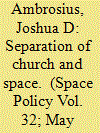

|
|
|
|
|
| Summary/Abstract |
Despite growing interest in the relationship between religion and outer space, the influence of religion on space policy attitudes remains a mostly unexplored topic. This study fills this research gap by treating space exploration as a policy issue for examination by religion and politics theory. It uses data from the General Social Survey and three Pew surveys to construct several logistic regression models. Space policy support, the dependent variable, is operationalized in seven ways as the antecedents of policy views (i.e., space knowledge and interest), actual policy/funding views, and policy expectations. Religion, the key independent variable, is operationalized as belonging (tradition), behavior (church attendance), beliefs, and salience. In addition, one survey permits the identification of the nature of science messages espoused by clergy. The findings reveal that Evangelical Protestants in the U.S. are the least supportive of space policy. However, evidence shows that pro-science messages from the pulpit can change Evangelicals' perceptions of space exploration. The article concludes with calls for increased, concerted outreach to Evangelicals and other religious publics by the space community. These efforts are essential if the American republic will pursue greater space exploration in the near future. Ultimately, religions must ensure their survival by embracing space.
|
|
|
|
|
|
|
|
|
|
|
|
|
|
|
|
| 14 |
ID:
103928
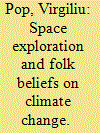

|
|
|
|
|
| Publication |
2011.
|
| Summary/Abstract |
This article surveys a series of folk beliefs of currency at the time of the Apollo missions, that link space exploration with disastrous events occurring at the same time. Floods, droughts, earthquakes and conjunctivitis-all were blamed, by people pertaining to very different cultures, on the actions of reckless astronauts who irked the Divinity or disturbed the celestial mechanics. As will become evident, these folk beliefs fit an existing pattern explainable in the context of "cultural lag" and "future shock." These social phenomena are common to sociology, and when referring to the context of outer space, fall under the purview of astrosociology.
|
|
|
|
|
|
|
|
|
|
|
|
|
|
|
|
| 15 |
ID:
142552
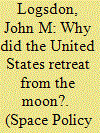

|
|
|
|
|
| Summary/Abstract |
On July 20, 1969, Neil Armstrong and Buzz Aldrin took the first human steps on a celestial body other than Earth. Just over two weeks later, on August 4, NASA presented to a committee charged with making recommendations on the U.S. post-Apollo space program a bold plan of continued lunar and Martian exploration. Over the next six months, that plan was decisively rejected by the administration of President Richard M. Nixon. In 1970, NASA canceled the final two Apollo missions to the Moon, and on January 5, 1972, President Nixon announced approval of the space shuttle program. Focusing the U.S. space program on operating the space shuttle and building a space station has kept the United States human space flight program confined to low Earth orbit for over four decades. There are lessons to be learned from the post-Apollo decisions in the United States for today's attempts to gain political support for a renewed and sustainable program of human exploration of the Moon, Mars, and other solar system destinations. This paper, drawing on in-depth research on the events of the 1969–1972 period in U.S. space policy, will discuss those lessons.
|
|
|
|
|
|
|
|
|
|
|
|
|
|
|
|
|
|
|
|
|